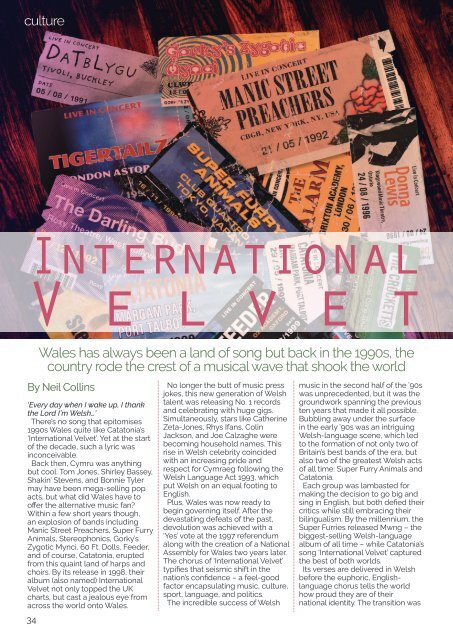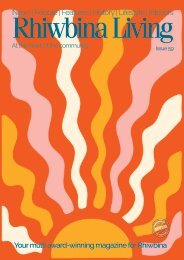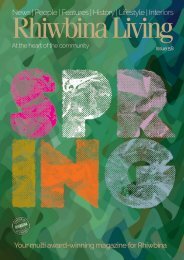Whitchurch and Llandaff Living Issue 70
Summer 2024 issue of the award-winning Whitchurch and Llandaff Living magazine.
Summer 2024 issue of the award-winning Whitchurch and Llandaff Living magazine.
Transform your PDFs into Flipbooks and boost your revenue!
Leverage SEO-optimized Flipbooks, powerful backlinks, and multimedia content to professionally showcase your products and significantly increase your reach.
culture<br />
International<br />
Velvet<br />
Wales has always been a l<strong>and</strong> of song but back in the 1990s, the<br />
country rode the crest of a musical wave that shook the world<br />
By Neil Collins<br />
‘Every day when I wake up, I thank<br />
the Lord I’m Welsh…’<br />
There’s no song that epitomises<br />
1990s Wales quite like Catatonia’s<br />
‘International Velvet’. Yet at the start<br />
of the decade, such a lyric was<br />
inconceivable.<br />
Back then, Cymru was anything<br />
but cool. Tom Jones, Shirley Bassey,<br />
Shakin’ Stevens, <strong>and</strong> Bonnie Tyler<br />
may have been mega-selling pop<br />
acts, but what did Wales have to<br />
offer the alternative music fan?<br />
Within a few short years though,<br />
an explosion of b<strong>and</strong>s including<br />
Manic Street Preachers, Super Furry<br />
Animals, Stereophonics, Gorky’s<br />
Zygotic Mynci, 60 Ft. Dolls, Feeder,<br />
<strong>and</strong> of course, Catatonia, erupted<br />
from this quaint l<strong>and</strong> of harps <strong>and</strong><br />
choirs. By its release in 1998, their<br />
album (also named) International<br />
Velvet not only topped the UK<br />
charts, but cast a jealous eye from<br />
across the world onto Wales.<br />
34<br />
No longer the butt of music press<br />
jokes, this new generation of Welsh<br />
talent was releasing No. 1 records<br />
<strong>and</strong> celebrating with huge gigs.<br />
Simultaneously, stars like Catherine<br />
Zeta-Jones, Rhys Ifans, Colin<br />
Jackson, <strong>and</strong> Joe Calzaghe were<br />
becoming household names. This<br />
rise in Welsh celebrity coincided<br />
with an increasing pride <strong>and</strong><br />
respect for Cymraeg following the<br />
Welsh Language Act 1993, which<br />
put Welsh on an equal footing to<br />
English.<br />
Plus, Wales was now ready to<br />
begin governing itself. After the<br />
devastating defeats of the past,<br />
devolution was achieved with a<br />
‘Yes’ vote at the 1997 referendum<br />
along with the creation of a National<br />
Assembly for Wales two years later.<br />
The chorus of ‘International Velvet’<br />
typifies that seismic shift in the<br />
nation’s confidence – a feel-good<br />
factor encapsulating music, culture,<br />
sport, language, <strong>and</strong> politics.<br />
The incredible success of Welsh<br />
music in the second half of the ’90s<br />
was unprecedented, but it was the<br />
groundwork spanning the previous<br />
ten years that made it all possible.<br />
Bubbling away under the surface<br />
in the early ’90s was an intriguing<br />
Welsh-language scene, which led<br />
to the formation of not only two of<br />
Britain’s best b<strong>and</strong>s of the era, but<br />
also two of the greatest Welsh acts<br />
of all time: Super Furry Animals <strong>and</strong><br />
Catatonia.<br />
Each group was lambasted for<br />
making the decision to go big <strong>and</strong><br />
sing in English, but both defied their<br />
critics while still embracing their<br />
bilingualism. By the millennium, the<br />
Super Furries released Mwng – the<br />
biggest-selling Welsh-language<br />
album of all time – while Catatonia’s<br />
song ‘International Velvet’ captured<br />
the best of both worlds.<br />
Its verses are delivered in Welsh<br />
before the euphoric, Englishlanguage<br />
chorus tells the world<br />
how proud they are of their<br />
national identity. The transition was

















